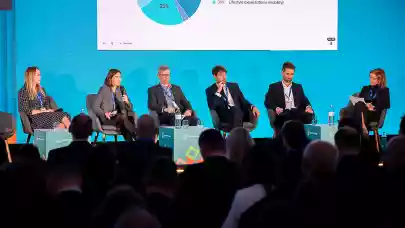
The CEE office market has been coping with post-COVID consequences and forcing both landlords and tenants to explore opportunities to improve space utilisation. Expert speakers at CEE Property Forum 2024 in Vienna have revealed interesting strategies for the best office assets in the panel dedicated to the office market.
The chair of the panel, Peter Malovec, Counsel at Taylor Wessing Slovakia opened the discussion focusing first on the current situation across the region.
David M Johnston MRICS, Senior Director, Head of Occupier Business Development CEE/SEE at CBRE Hungary noted that Prague has been a standout performer with a 22% increase in leasing activity compared to the previous year, while Bucharest has seen a 27% reduction. „Budapest has got 600 - 650,000 sqm of office space under construction, which on the surface sounds like a lot. Then you've got to take into account that 60% of that's been pre-leased by the public sector with delivery by 2026. Thus the net space coming on is quite low,“ he added and highlighted that the vacancy rate ranges from 8% to 14% across the region.
Andreea Cotiga, Head of Leasing Office at CPI Romania confirmed that the trends described by David aligned with her market observations in Bucharest. „The total leasing activity for the three-quarters of the of this year was at around 260,000 sqm this year, and mostly went to renewals.“
Peter Malovec asked about the key indicators that could help change the markets going forward. David suggested that tenants should start using the space more efficiently rather than expanding. „Another indicator is lease lengths. My colleagues in Warsaw wisely informed me that seven years is the new five for larger occupiers,“ he declared.
Peter suggested: „We know that the tenants go for less space, but as landlords, what can you do concerning the amenities?“ Andreea explained that the transition to hybrid work models had influenced office utilisation, with companies defining their hybrid working models. „I do not expect a return to the pre-pandemic levels anytime soon. I think that era with the industrial working model, where you are coming to the office from Monday to Friday, 9 am to 5 pm and you were getting a signed dedicated table or desk is just over.“
On the other hand, Andreea emphasised the importance of diversifying tenant needs within a portfolio to improve space utilisation and create synergies. „We have fully converted two of the buildings in our portfolio into private hospitals and have another four buildings currently accommodated to large medical clinics. These activities cannot be performed remotely, even according to a hybrid model,“ she added a tenant strategy option.
„The growth of flex offices seems to be unstoppable, and many landlords are adding flex space to be operated in-house. Flex operators are very much expanding as well. How do you see the future of flex offices at the moment?“ Peter turned to another topic in the discussion.
Michal Dorszewski, Regional Director Partnership Development CEE at IWG plc, confirmed the growth of flex offices, with IWG planning to add 20,000 locations globally: „We think that the office is not dead, but the shift has happened, and we just provide the solution how to deliver the same space on the market differently.“ He explained that flex offices provide a service that meets the demand for short-term, flexible workspace solutions, especially for smaller companies. „Most companies globally are looking for five desks, maybe 10 to 50 desks, but not thousands of meters for five-seven years. We heard today that this market is not anymore about yields. This market is about cash. This means rent. You can monetise the assets above the headline rent because people are happy to pay more for what they use. If they don't sit on 3,000 sqm using only 1,000 sqm they are happy to pay more to the upper.“
Michal also noted that the demand for flex offices is driven by the need for interaction and convenience, especially for employees working from home. „We need the service, a place to interact next to our home. This is the way how employers should address the needs of employees.“
Hubert Abt FRICS, CEO at New Work & workcloud24 agreed that major shifts in the industry, such as the pandemic and the rise of new technologies, required landlords to adapt their strategies. „We talk about a strategic inflection point if an industry is shifting in an area which we haven't experienced so far. It appeared when Nokia decided not to follow the smartphone trend. We know what happened and we should take into consideration what happens in the world today,“ he gave an example from the past and named 3 events that are out of our experience so far: pandemic, ChatGPT and going carbon-neutral. He emphasised the importance of the right perspective: „Steve Jobs said, if you want to understand your product, you need to develop it from the customer backwards.“
Hubert suggested that landlords should consider operational models similar to shopping malls, where profit is generated from turnover rent and a centralised management approach. „You copy-paste what we see today in the shopping malls. The profit of the asset is not generated by the anchor tenant and by the long-term leases but by the turnover rent from a shopping mall. Unless this doesn't happen, we are not prepared for the times coming.“
Finally, Hubert added that the B-class buildings are the most challenging assets, as they struggle to meet ESG standards and attract tenants. „Landlords need to create innovative ideas to repurpose and modernise B-class buildings to meet market demands. I guess that's the main challenge we have to face,“ he concluded.




